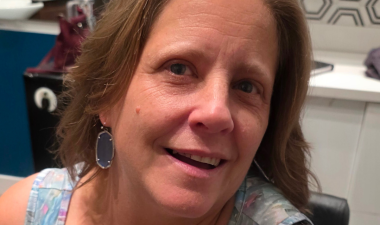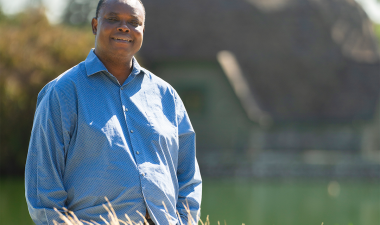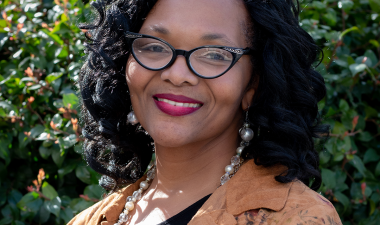Jase Teoh has spent the better part of two years helping others at Stanislaus State adapt to the online learning thrust upon them in response to the COVID pandemic.
Now, the University’s director of academic technology is going to focus on learning, challenging and improving herself as one of 12 applicants selected for the first cohort of the Next Leaders Fellowship (NLF), a one-year program aimed at increasing the number of Black, Indigenous and people of color (BIPOC) in senior roles in higher education information and technology.
Sponsored by Educause, NLF includes mandatory attendance at conferences and will match each fellow with a mentor.
“What really attracted me is the investment in mid-level professionals aspiring to be in senior leadership positions in information technology or academic technology,” Teoh said. “I wrote about the importance of mentorship and expressed the need to look for more diverse, equitable, and inclusive voices around the chief information officer table, particularly those in more senior positions. The Next Leadership Fellowship provides that with 12 chief information officers from diverse backgrounds and from different universities looking to invest in mid-career BIPOC professionals and encouraging us to rise above our level.”
Specific details about what to expect this year will be discussed in March when the fellows and Educause leaders meet for the first time at the NorthEast Regional Computing Program (NERCOMP) annual conference in Providence, Rhode Island.
“They will probably break us into groups, ask us where we are on our career trajectory, where we hope to see ourselves and how we plan to get there,” Teoh said.
She also expects them to assign a mentor, who can explain the intricacies of the day-to-day operations of a higher education CIO.
“I would guess there will be a lot of discussions and exchanges about our roles as BIPOC and how we fit in, what are our challenges and how can we be more visible as leaders in the information technology industry,” Teoh said.
She also expects them to assign a mentor, who can explain the intricacies of the day-to-day operations of a higher education CIO.
“I would guess there will be a lot of discussions and exchanges about our roles as BIPOC and how we fit in, what are our challenges and how can we be more visible as leaders in the information technology industry,” Teoh said.
“What really attracted me is the investment in mid-level professionals aspiring to be in senior leadership positions in information technology or academic technology. The Next Leadership Fellowship provides that with 12 chief information officers from diverse backgrounds and from different universities looking to invest in mid-career BIPOC professionals and encouraging us to rise above our level.”
-Jase Teoh
Teoh, who began at Stan State in summer 2019 when academic technology shifted to the Provost’s Office from the Office of Information Technology (OIT), doesn’t have a specific career path in mind.
“I need more experience, which is why I am in this fellowship,” Teoh said. “I need to understand more of the intricacies of the other divisions, and how to work on a systems level to thoroughly understand how, organizationally, what one does affects the other, and with tighter communication and collaboration across colleges, divisions and departments, we can rise to face the insurmountable challenges of technology, teaching and learning integration in our lifetime and beyond.”
The world has changed dramatically since Teoh arrived on campus in 2019. COVID arrived seven months after she began and forced almost everyone off campus.
She and the rest of the University’s population learned just how much could be accomplished remotely.
Teoh was able to achieve, in a virtual world, the three key goals former Provost Kim Greer laid out for her when she was hired.
First, the faculty switched from Blackboard as a learning management system to Canvas. Teoh had used her limited time on campus to meet with stakeholders, give demonstrations and have faculty from universities using each program visit to share the benefits and drawbacks of each. When she was done, the faculty voted to make the switch — three months into forced remote teaching — with 91 percent Academic Senate approval.
The second objective, to promote accessibility of instructional materials, is a work in progress. Some faculty have embraced the Ally tool to improve digital material presented to students. Others have yet to learn of the importance of the instructional accessible tool and how it can cater to diverse learning styles while promoting diversity, equity and inclusion for students. Teoh and her team continue to offer virtual institutes year-round with a focus on accessibility, instructional design and academic technology tools to enhance student engagement.
Finally, Greer wanted Teoh to increase her office’s visibility as a member of the Provost’s Office.
“I think I’m visible enough,” Teoh said, laughing.
She was a go-to person when COVID hit, joining OIT staff to support faculty.
Teoh held online training sessions and, along with those offered by the Chancellor’s Office and Faculty Center for Excellence in Teaching and Learning (FCETL) Director Shradha Tibrewal, saw more than 1,500 faculty complete courses.
She helped those new to remote teaching as well as those accustomed to Blackboard transition to Canvas. Suddenly, faculty who’d never needed to know about Zoom were uploading their slides, conducting breakout rooms, polling and facilitating classes.
Teoh led her small staff in supporting faculty through what will undoubtedly be seen as one of the most challenging times in their careers.
Moving forward, Teoh hopes to increase the number of instructional designers in her department to provide the four colleges with a dedicated first point of contact to assist faculty in much more than just troubleshooting technical issues.
“We can, in fact, assist faculty in course design in collaboration with faculty as the subject matter expert and a librarian as the information literacy expert,” she said.
Personally, Teoh is looking forward to being challenged and inspired, and to keep improving her leadership skills.
“We bring with us our prior experience into whatever role we are in, and I strongly believe it is our responsibility to empower others to be better leaders and to do so with cultural humility, respect, trust and inclusivity,” Teoh said.



